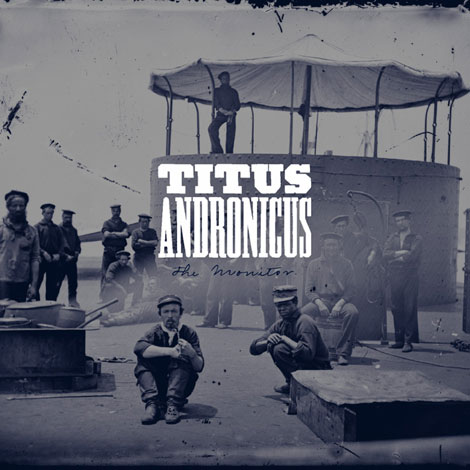
I'm a sucker for concept albums. Especially concept albums that lose their way about halfway in or sidetrack all the way round till it ends up where it's supposed to be. That's the key: You can lose your way, but get back home. That's all I ask. (Thanks, Tommy and The Wall for playing fair. Um, Green Day, what were we talking about again?)
The Montor, the excellent new album by New Jersey's Titus Andronicus, is a concept album. It doesn't quite lose its way as much as it sorta never has anywhere to go in the first place. But it has a lot to say. And a lot of ground to cover. And 150 years of American history to survey. And it does so by pretty much staying in one place.
The band says The Monitor is about the Civil War. Specifically, it's about a warship called the USS Monitor that the Navy commissioned for battle. Apparently there was a hell of a skirmish between the vessel and another one on March 9, 1862 — which happened 148 years to the day before The Monitor was released.
It makes for a great backstory, and there's certainly a vague theme about the Civil War running through the album (some of this has to do with frontman Patrick Stickles' high-school teacher reciting Abraham Lincoln before many of the songs).
Even without that "concept album" thing going for it, The Montor is a major achievement. It's 2010's first great album, and the first record in a long time that actually seems to get what rock and roll is all about. It's messy, it's pretentious, it's ambitious. And it's fucking brilliant.
The easy equation for Titus Andronicus goes something like this: Bright Eyes + the Clash + the Pogues + Billy Bragg + Bruce Springsteen.
But the quintet goes way deeper than that sum on The Monitor.
Way deeper.
Ten songs, 65 minutes.
The longest cut — the album-closing epic "The Battle of Hampton Roads" — runs 14 minutes. But you don't know this. You don't want to know this. Take it as an hour-long suite.
Threaded together so that it all flows like one cohesive piece (except for one jarring track near the end of the album), The Monitor rolls together themes of peace/war, unity/separation, drinking, defeating and shout-outs to Bruce Springsteen (there's a pair of them, including a "Born to Run" reference in the first song).
Stickles spits out his words like there's way too many of them in his head fighting for room — they just need to get out, even if that means some are slurred, incomprehensible or even possibly made up. He's a sharp songwriter who composes like a barstool poet: "Everybody raise your glasses high," he sings in "Theme From 'Cheers'." "Kiss good times goodbye."
He's fatalistic (he's writing about the Civil War, after all; you don't get more U.S. fucked than that). He's irritated. He's confused. And he may not be drunk enough ("Theme From 'Cheers'" slips into an "I need a whiskey" chant toward the end). But it all comes back to the fatalism: "What the fuck was it all for anyway?" he asks before the band unleashes a torrent of guitars.
Sometimes those guitars sound like bagpipes on The Monitor. Sometimes they sound like a wall of distortion. And sometimes they sound like guitars. But like everything else on the album, they're grand and way too big to be contained by state lines or an ancient war that in anybody else's hands (except for maybe Robbie Robertson and the Band's) would sound like a musty old history lesson. (And yeah, parallels between the Civil War and whatever the fuck our country is involved in now are there.)
Here, the Civil War is loud. It's dangerous. It's rousing. But most of all it's the catalyst for America 2010: youth gone wild, drunken nights out with your boys and that doomed charm driving it all. "The enemy is everywhere," is a recurring line on The Monitor. But in the very end, Stickles lets out a series of defeated "Don't ever leave me," even with all the violence and chaos swirling around him.
It's a brilliant moment on a brilliant album.
Only the eighth song, "To Old Friends and New," a crawling dirge, doesn't immediately fit on the album. Eventually, with further listens, it makes sense, mainly to set up the final two songs, which charge out of "To Old Friends and New" like they couldn't wait for the song to end either (Song 9, "... And Ever" includes honking sax, an indie-rock drum solo and Stickles' teacher again).
By the time that great 14-minute closer starts, Titus Andronicus have brought The Monitor back on point to its "concept."
But that journey — from battlefields to barstools to dirty floors to New Jersey shores — manages to tell us something about the way were we are in 2010. Quite an accomplishment for an album that's supposedly about the past. —Michael Gallucci (follow me on Twitter @mgallucci)












